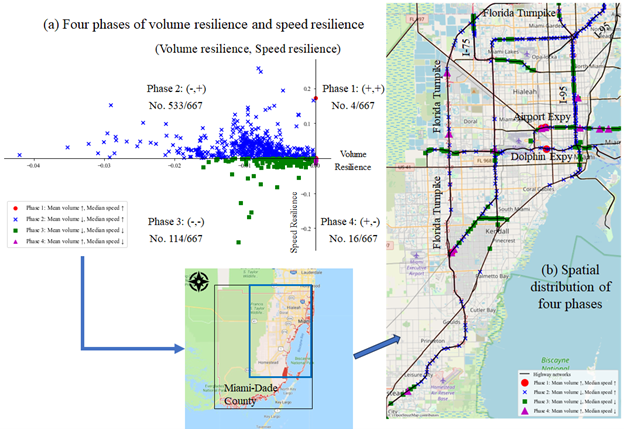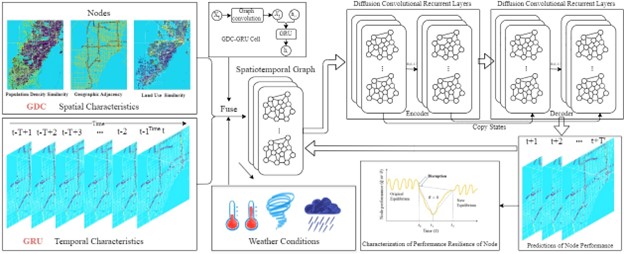Overview
Urban Resilience is an emerging discipline to study the ability of an urban system - all its constituent socio-ecological and socio-technical networks across temporal and spatial scales - to maintain or rapidly return to desired functions in the face of a disturbance, to adapt to change, and to quickly transform systems that limit current or future adaptive capacity (Meerow et al. 2016). In this track, I focus on performance resilience of transportation networks and climate resilience of urban housing to investigate the impact of extreme weather events:
Extreme Weather Events
Vulnerability Assessment
Transportation Network Resilience
Climate Resilience
Disaster Recovery & Housing
Research Project
| Characterizing Miami-Dade County's Highway Network Resilience Against Hurricanes |
 |
|
Analyze changes in average traffic volume and median traffic speed due to disruptions to quantify volume and speed resilience
Identify four resilience phases including negative volume, positive speed (80% of networks); both negative (17%); both positive (0.6%); positive volume, negative speed (2.4%) in Miami-Dade County
|
| Predicting Miami-Dade County's Highway Network Resilience Against Hurricanes |
 |
|
Develop a Spatiotemporal Graph Convolutional Recurrent Neural Network (ST-GCRNN) model to forecast highway network resilience
Compare different methods for constructing undirected and directed geospatial graphs, separately based on geographic, land use, and population density similarities
|
Publications
Journal Papers
- Lu, K., Liu, Y., Peng, Z., Zhai, W. (2025). Characterizing Performance Resilience of Transportation Networks against HUrricane Events. Applied Geography. (In Press)
- Yang, X., Lu, K., Li, X. (2025). Assessing Vulnerability of Rural Buildings to Tornadoes and Their Relationships with Building Attributes and Surrounding Land Uses. International Journal of Disaster Risk Reduction
- Lu, K., Liu, Y., Peng, Z., Zhai, W. (2025). Evaluating and Predicting Transportation Network Performance Resilience to Extreme Weather Events: A Spatiotemporal Multi-Graph Diffusion Convolutional Recurrent Neural Network (ST-MGDCRNN) Approach. IEEE Transactions on Intelligent Transportation Systems (T-ITS). (Under Review)
- Yang, X., Li, X., Lu, K., & Peng, Z. (2023). Integrating Rural Livelihood Resilience and Sustainability for Post-disaster Community Relocation: A Theoretical Framework and Empirical Study. Natural Hazards, 116(2), 1775-1803 [Text].
Book Chapters
- Peng, Z., Zhai, W., Lu, K. (2022). Smart, Sustainable, and Resilient Transportation System. In: Li, B., Shi, X., Zhu, AX., Wang, C., Lin, H. (eds) New Thinking in GIScience. Springer, Singapore [Text].
Presentations & Talks
- 2025.01: Transportation Research Board 104th Annual Meeting. Characterizing Performance Resilience of Transportation Networks against Extreme Weather Events. Washington D.C., USA.
- 2023.10: Association of Collegiate Schools of Planning (ACSP) Conference. Leveraging Deep Learning with Geospatial Data Analytics for Quantification and Prediction of Performance Resilience of Transportation Networks against Extreme Weather Events. Chicago, IL, USA.
- 2023.01: Transportation Research Board 102nd Annual Meeting. Characterization and Prediction of Transportation Network Resilience: A Spatiotemporal Graph Diffusion Convolutional Recurrent Neural Network Approach. Washington D.C., USA.

